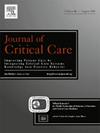Effects of levosimendan on weaning from mechanical ventilation: A systematic review and meta-analysis
IF 2.9
3区 医学
Q2 CRITICAL CARE MEDICINE
引用次数: 0
Abstract
Background
There remains ongoing controversy and debate regarding the effect of levosimendan on weaning from mechanical ventilation in critical ill patients relying on ventilator. The objective of this study is to assess the specific effect of levosimendan on weaning from mechanical ventilation and to ascertain whether levosimendan can indeed improve the prognosis.
Methods
This meta-analysis was proactively registered on PROSPERO platform. The PubMed, Web of Science, Embase, ScienceDirect and Cochrane were searched from inception to June 2024. The primary outcome of interest was duration of mechanical ventilation. Secondary outcomes included mortality rates, as well as length of stay in both intensive care unit (ICU) and the hospital.
Results
Six studies (n = 1069 patients) were included in the analysis ultimately. In relation to the primary outcome, the findings revealed that patients who received levosimendan experienced a significantly earlier successful weaning from mechanical ventilation compared to those who did not receive the medication [Mean Difference (MD) = −1.86 (95 %CI, −2.71 to −1.01, P < 0.01]. For the secondary outcomes, levosimendan was associated with a notable in both length of ICU stay [MD = -36.89 (95 %CI, −70.68 to −3.11, P < 0.01] and the total in-hospital stay [MD = -51.77 (95 %CI, −92.34 to −11.20, P < 0.01]. Levosimendan did not demonstrate a statistically effect in reducing mortality rates [Relative Risk(RR) =0.65 (95 %CI, 0.27 to 1.57, P = 0.40].
Conclusion
Levosimendan helps patients weaning from mechanical ventilation occuring earlier and reduces length of stay (ICU and hospital), but does not affect mortality.
左西孟旦对机械通气脱机的影响:系统回顾和荟萃分析
关于左西孟旦对依赖呼吸机的危重患者机械通气脱机的影响仍存在争议和争论。本研究的目的是评估左西孟旦对机械通气断奶的具体影响,并确定左西孟旦是否确实可以改善预后。方法本荟萃分析在PROSPERO平台上主动注册。PubMed, Web of Science, Embase, ScienceDirect和Cochrane从成立到2024年6月进行了检索。主要观察指标为机械通气持续时间。次要结局包括死亡率,以及在重症监护病房(ICU)和医院的住院时间。结果6项研究(n = 1069例)最终纳入分析。关于主要结局,研究结果显示,与未接受左西孟旦治疗的患者相比,接受左西孟旦治疗的患者成功脱离机械通气的时间明显提前[平均差异(MD) = - 1.86 (95% CI, - 2.71至- 1.01,P <;0.01]。对于次要结果,左西孟旦与ICU住院时间均显著相关[MD = -36.89 (95% CI, - 70.68至- 3.11,P <;0.01]总住院时间[MD = -51.77 (95% CI, - 92.34 ~ - 11.20, P <;0.01]。左西孟旦在降低死亡率方面没有统计学效果[相对危险度(RR) =0.65 (95% CI, 0.27 ~ 1.57, P = 0.40]。结论左西孟旦有助于患者提前脱离机械通气,缩短住院时间(ICU和住院时间),但不影响死亡率。
本文章由计算机程序翻译,如有差异,请以英文原文为准。
求助全文
约1分钟内获得全文
求助全文
来源期刊

Journal of critical care
医学-危重病医学
CiteScore
8.60
自引率
2.70%
发文量
237
审稿时长
23 days
期刊介绍:
The Journal of Critical Care, the official publication of the World Federation of Societies of Intensive and Critical Care Medicine (WFSICCM), is a leading international, peer-reviewed journal providing original research, review articles, tutorials, and invited articles for physicians and allied health professionals involved in treating the critically ill. The Journal aims to improve patient care by furthering understanding of health systems research and its integration into clinical practice.
The Journal will include articles which discuss:
All aspects of health services research in critical care
System based practice in anesthesiology, perioperative and critical care medicine
The interface between anesthesiology, critical care medicine and pain
Integrating intraoperative management in preparation for postoperative critical care management and recovery
Optimizing patient management, i.e., exploring the interface between evidence-based principles or clinical insight into management and care of complex patients
The team approach in the OR and ICU
System-based research
Medical ethics
Technology in medicine
Seminars discussing current, state of the art, and sometimes controversial topics in anesthesiology, critical care medicine, and professional education
Residency Education.
 求助内容:
求助内容: 应助结果提醒方式:
应助结果提醒方式:


